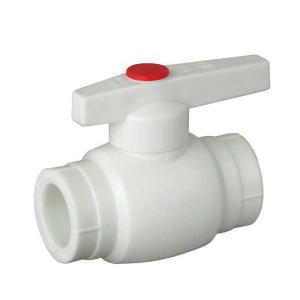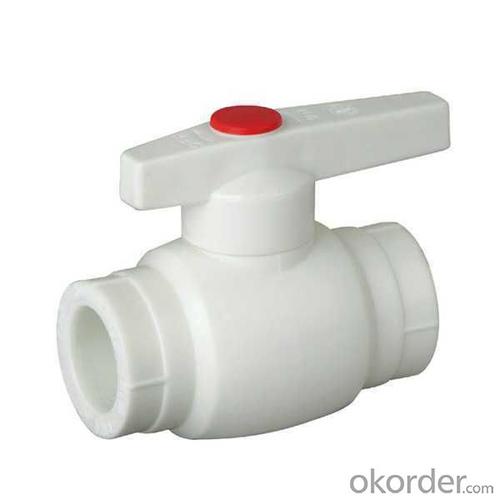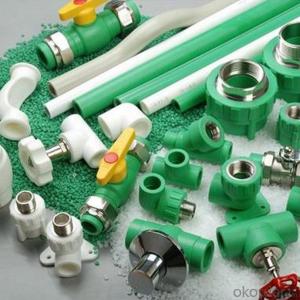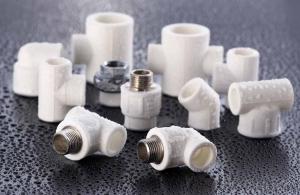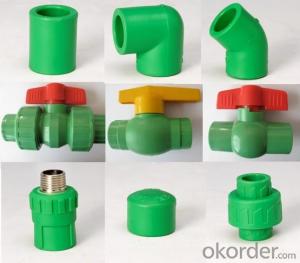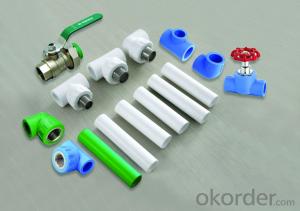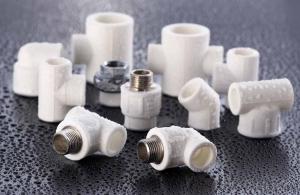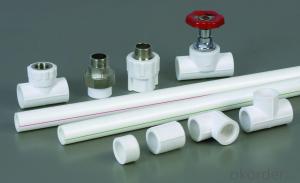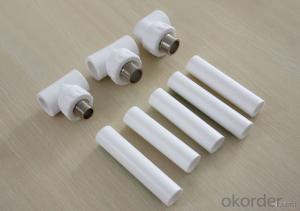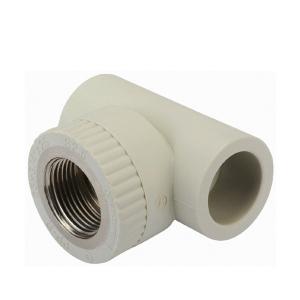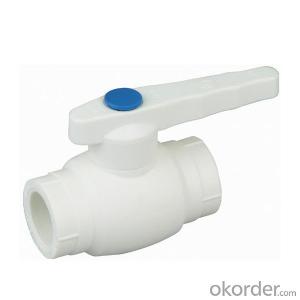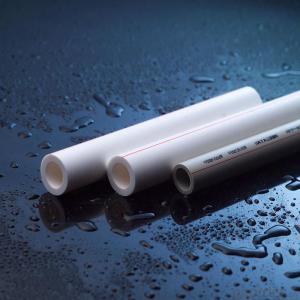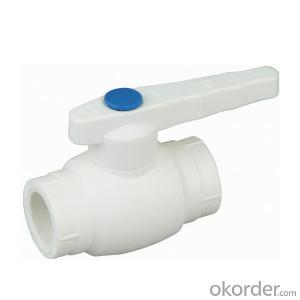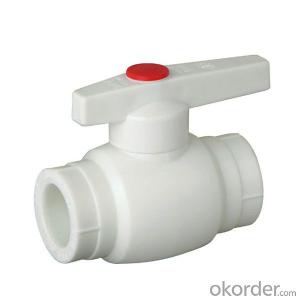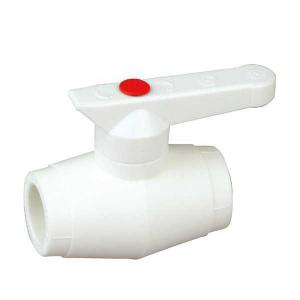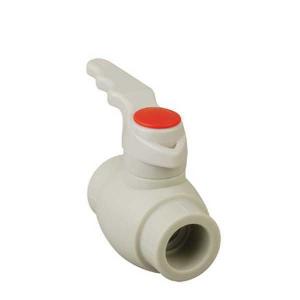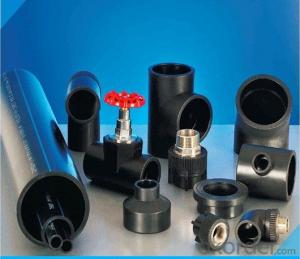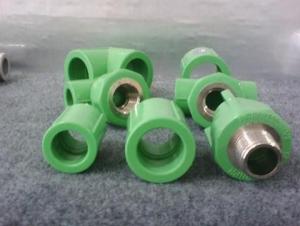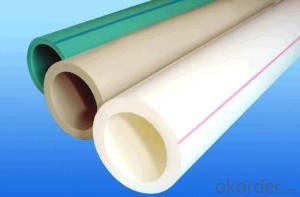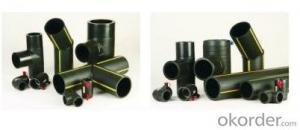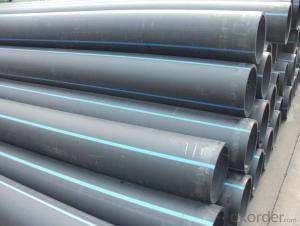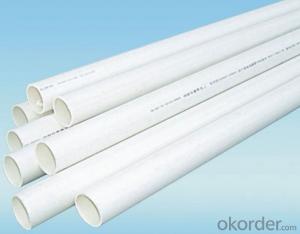High Quality A1 Type PP-R Ball Valve with Brass Ball - Plastic Water Pipe Compression Fittings
- Loading Port:
- Ningbo
- Payment Terms:
- TT or LC
- Min Order Qty:
- 1000 pc
- Supply Capability:
- 100000 pc/month
OKorder Service Pledge
OKorder Financial Service
You Might Also Like
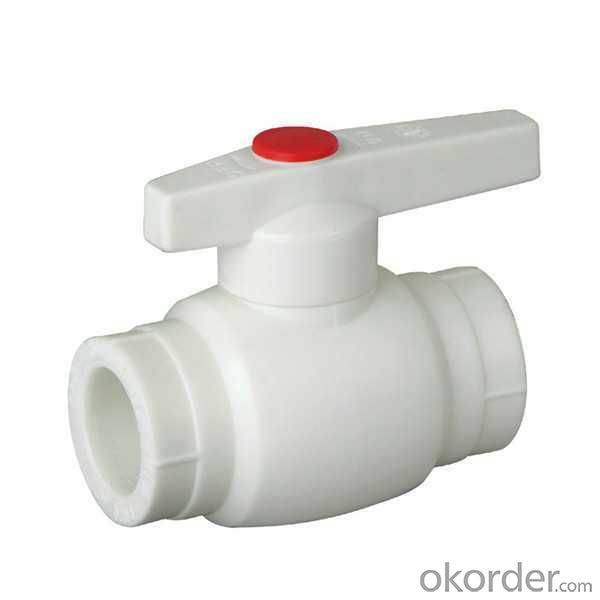
PP-R ball valve with brass ball size:20-40
1.Material:Random Polypropylene(Hyosung R200P);
2.ISO9001&ISO14001;
3.Standard:GB/T 18742.3-2002, DIN8077/8078;
4.OEM also ok
1) Healthy, bacteriological neutral, conforming to drinking water standards
2) Resistant to high temperatures, good impact strength
3) Convenient and reliable installation, low construction expenses
4) Excellent heat-insulation property from minimum thermal conductivity
5) Lightweight, convenient to transport and handle, good for labor-saving
6) Smooth inner walls reduce pressure loss and increase flow speed
7) Sound insulation (reduced by 40% compared to galvanized steel pipes)
8) Light colors and excellent design ensure suitability for both exposed and hidden installation
9) Recyclable, environment-friendly, accords with GBM standards
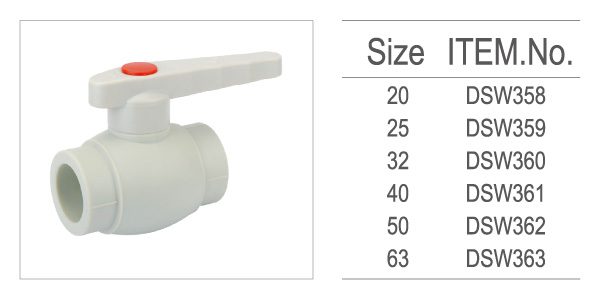
- Q: What are the common shapes and configurations of plastic pipe fittings?
- The common shapes and configurations of plastic pipe fittings include elbows, tees, couplings, reducers, caps, and plugs. These fittings are designed to connect and redirect the flow of plastic pipes, ensuring a secure and leak-free connection.
- Q: Can plastic pipe fittings be used in hot tub systems?
- Yes, plastic pipe fittings can be used in hot tub systems. However, it is important to ensure that the plastic used is specifically designed to withstand the high temperatures and chemicals found in hot tub water. Using fittings made from materials such as PVC or CPVC can be a suitable option for hot tub plumbing systems.
- Q: Are plastic pipe fittings suitable for offshore oil and gas platforms?
- Yes, plastic pipe fittings are suitable for offshore oil and gas platforms. They have several advantages such as corrosion resistance, lightweight construction, and ease of installation and maintenance. Additionally, plastic fittings can withstand harsh environmental conditions and offer cost-effectiveness in comparison to traditional metal fittings. However, it is crucial to consider the specific requirements and conditions of the offshore platform before making a final decision on the suitability of plastic pipe fittings.
- Q: Can plastic pipe fittings be used in laboratory systems?
- Yes, plastic pipe fittings can be used in laboratory systems. Plastic fittings are often chosen for their corrosion resistance, chemical compatibility, and lower cost compared to metal alternatives. However, it is essential to select the appropriate plastic material that meets the specific requirements of the laboratory system, such as temperature and pressure limits, and to ensure proper installation and regular inspection to maintain safety and integrity.
- Q: Can plastic pipe fittings be used in wastewater systems?
- Yes, plastic pipe fittings can be used in wastewater systems. Plastic pipe fittings, such as PVC or ABS fittings, are commonly used in wastewater systems due to their durability, resistance to corrosion, and ease of installation. These fittings are designed to handle the demands and pressures of wastewater systems effectively.
- Q: What are the common materials used for plastic pipe fittings?
- The common materials used for plastic pipe fittings include PVC (polyvinyl chloride), CPVC (chlorinated polyvinyl chloride), PP (polypropylene), PEX (cross-linked polyethylene), and ABS (acrylonitrile butadiene styrene).
- Q: Are plastic pipe fittings resistant to rodent damage?
- Yes, plastic pipe fittings are generally resistant to rodent damage. Unlike materials such as wood or rubber, plastic is not appealing to rodents as it does not provide them with a food source. Additionally, plastic is not easily chewable or destructible by rodents, making it a reliable choice for protecting pipe fittings from rodent damage.
- Q: Are plastic pipe fittings suitable for chemical transfer applications?
- Yes, plastic pipe fittings can be suitable for chemical transfer applications. However, it is important to select the appropriate type of plastic material that is resistant to the specific chemicals being transferred. This will ensure the fittings can withstand the chemical exposure and prevent any leaks or potential contamination. Additionally, proper installation and regular maintenance are crucial to ensure the longevity and effectiveness of plastic pipe fittings in chemical transfer applications.
- Q: Do plastic pipe fittings require any special testing or certification?
- Yes, plastic pipe fittings typically require special testing and certification to ensure they meet industry standards for performance, durability, and safety. This testing is necessary to ensure that the fittings can withstand various pressures, temperatures, and chemicals they may encounter during their intended use. Certification from recognized organizations or regulatory bodies confirms that the fittings have undergone rigorous testing and comply with relevant standards, providing assurance to customers and end-users.
- Q: Do plastic pipe fittings meet building code requirements?
- Yes, plastic pipe fittings can meet building code requirements. However, it is important to ensure that the specific type and brand of plastic pipe fittings being used comply with the building codes and standards set by local authorities. Plumbing codes may vary in different regions, so it is essential to consult with local authorities or a licensed professional to ensure compliance with the building code requirements.
Send your message to us
High Quality A1 Type PP-R Ball Valve with Brass Ball - Plastic Water Pipe Compression Fittings
- Loading Port:
- Ningbo
- Payment Terms:
- TT or LC
- Min Order Qty:
- 1000 pc
- Supply Capability:
- 100000 pc/month
OKorder Service Pledge
OKorder Financial Service
Similar products
Hot products
Hot Searches
Related keywords
